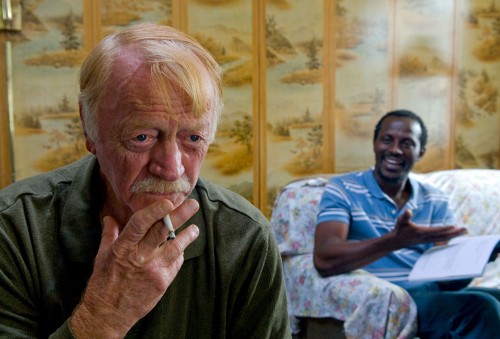Goodbye Solo
Old Man Take a Look at My Life

Starring: Souleymane Sy Savane, Red West
By Robert Patrick
Director Ramin Bahrani, heralded for his uncompromising look at the stark and rocky foundations of the poor and struggling, kicks his shovel into the dirt, yet again, to dig even deeper into the worm ridden soil of the poor and underprivileged. While Bahrani’s work is good at uprooting the untold stories of citizens who, despite living in this country, have yet to see their lives manifest through a film medium, Bahrani’s lazy prose is barely able to entertain. In the director’s last opus, Chop Shop, the young boy in the film, skipping auto parts like stones on a pond, went about his daily business with an oil smeared face, as if he was decorated with a sort of makeshift war paint. The film, through lacking adequate pacing and coherency, ultimately benefited from the raw, unabridged look at the boy’s hardships by showing them through a camera wiped with dirt and transmission fluid; you felt that you were with him, on an authentic journey..
In Goodbye Solo, Bahrani, in choosing to once again plunge his hands into the abyss of the lost and forgotten, takes two individuals, both uniquely different in attitude, age and ethnicity, and throws them against the wall, like dice in a game of craps, to see what falls where.
Solo, a taxi driver in Winston-Salem, North Carolina, is good natured and flippant. There is always a bounce in his step, a firecracker in his words, and a smile fastened to his lips. One day, when picking up a passenger, he notices something strange about the old man. The old codger’s face looks bleached by sun, and his voice, puttering unintelligibly in the backseat, sounds like a rattlesnake’s tail. There is no doubt, upon quick inspection, that the senior is miserable by his wild locks of receding hair, the drooping of his posture, and the hostile attitude he exhibits. The man, whose name is William, wants Solo to drive him, in one week’s time, to the top of blowing rock to commit suicide. Because of Solo’s congenial nature, he tries to prevent William from launching himself off a rock, if only to save himself some sanity while committing some good.
For the rest of the movie William floats around, despondent, like a ghostly orb that is lost in time. Solo, meanwhile, attempts to cheer the old man up by joking with him, taking him to parties, and even inviting him to his house. The journey to prevent William from suffering his own self-inflicted demise is long, arduous, and unsympathetically boring.
The problem with Bahrani’s movie is that, while it attempts to be selfless and poetic, it embraces its own mission with too much pride and acknowledgment of its righteousness. Minimalism is at an all-time high here, as the camera sweeps back and fourth, capturing nothing, as if someone forgot to put the lens cap on the recorder after a day of shooting. Most of the footage deals with slabs of concrete, inanimate foliage, and strips of quiet roads. There were points during this debacle that I wanted to plow down the door to the projectionist’s room, start scissoring footage, then replay the film as a short.
Also we’re to believe that, by revealing nothing about the character of William, we’re supposed to care about his preservation. Throughout the movie we understand that the old badger enjoys Hank Williams and has the capability to make a mean sandwich. These trivialities don’t supply me with enough personal information to make me emotionally invest in the character. I think Bahrani, in his own skewed way, is more concerned with tinkering around with his camera than, say, writing a dialogue for interesting characters.
The acting, anchored by the newcomer Sy Savane, is better than the script deserves. Red West, who plays opposite of Sy Savane, is good as the cankerous William. And the score of the film, largely forgettable as a whole, could’ve been the sound of a car horn and I wouldn’t have noticed.
The ending, which is practically hallucinatory in its own overambitious way, serves as a kind of watermark for the type of emotional impact that Bahrani wants the audience to inherit. To be successful at exploiting emotions, you have to, above all else, make the audience believe in what they’re feeling; here, Bahrani tells his viewers what he wants them to feel, and expects applause from it.
2/5
